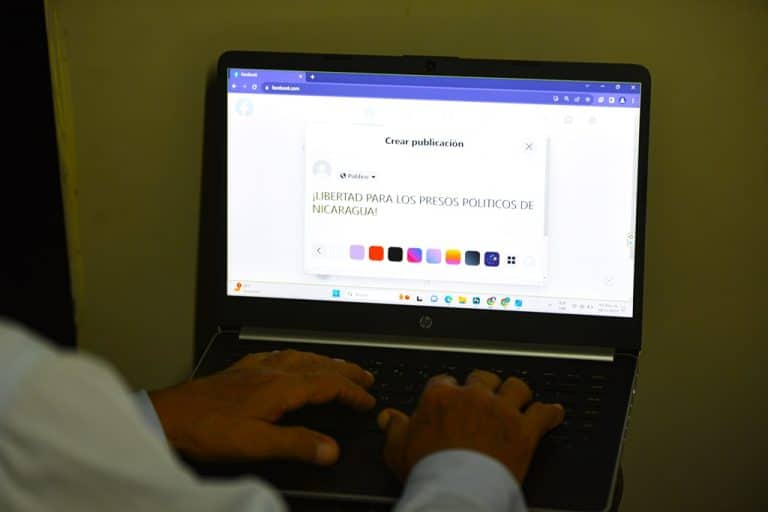11 de diciembre 2023

Children of Exile: The Births “Sowing Hope” in the Camp of Nicaraguan Farmers


Los negocios de la Alcaldía de Managua con las viviendas “Bismarck Martínez”
Recibe lo más destacado de la cobertura de CONFIDENCIAL todos los días.
Sign up for our weekly newsletter. We will send it to you every Friday at 10:00 am (Nicaragua time)
PUBLICIDAD 1M
PUBLICIDAD 4D
PUBLICIDAD 5D
Regime used the Cybercrimes Law as a “gag law”to criminalize opponents and journalists. It now extends against any citizen voicing opinions or dissent

Foto: Confidencial
11 de diciembre 2023
The Ortega regime’s tolerance for criticism on social media has sunk to zero. Any citizen in Nicaragua who posts an opinion against the regime can be imprisoned, whether they had one follower or thousands. The objective is to “criminalize” and “neutralize” any and all critical voices, state criminal lawyers after analyzing the recent abduction and jailing of Professor Freddy Quezada and Tik Tokker Geovany Lopez Acevedo.
“The government’s message [with these detentions] is clear: he or she who opens their mouth and expresses their thoughts [against government policies] is going to jail,” affirmed “Manuel” [assumed name], a criminal lawyer.
The attorney noted that the so-called “Gag Law” – officially the Special Cybercrimes Law – was initially utilized as a “political instrument” to process and sentence political and social leaders who are now banished from Nicaragua. However, in the three years since its approval, its application against the public has been generalized.
Juan Diego Barbarena, a lawyer and member of the opposition, considers that this legislation is no longer a law aimed at political dissidents, but now functions as a legal tool to “implant” more fear and to silence the population, no matter what type of criticism was expressed on the social networks.
Geovany Lopez was detained by the police on November 22, after he criticized on TikTok the television news anchors of the government-allied Channel 13 for making fun of the life history of Sheyniss Palacios, the young Nicaraguan woman who become Miss Universe on November 18.
Meanwhile, Freddy Quezada, who criticized the dictatorship on his social media account was taken from his home by plain-clothed officials on November 29. Both were then transferred to Nicaragua’s La Modelo prison, according to press reports.
The day before his detention, Quezada, a philosopher and sociologist, questioned the Ortega regime’s post supposedly showing the “preferential conditions” supposedly enjoyed by Nicaraguan bishop Rolando Alvarez in the La Modelo prison.
“The dictatorship kept 222 people in jail, who they were later forced to release and banish. All of them have told of their experiences and the simulations they endured. So how can this fox-brained dictatorship believe now that anyone is going to give credence to this ‘mise a scene’ of Bishop Rolando Alvarez?” Quezada posted on November 28, in addition to comments on an article about the Sandinista agricultural reform.
The university professor’s X account had 1,766 followers, while the Tik-Tokker had 39,000 on that network. To the lawyers analyzing these events, this difference in scope and publics demonstrates that both were taken to jail “merely for expressing their opinions.”
Neither of the two detainees had sites whose principal contents were political; for that reason, Manuel indicates, “the prevalent motive was the dictatorship’s need to criminalize the right to free expression,” even though it’s guaranteed in the Nicaraguan Constitution.
“The application of the ‘Gag Law’ has evolved. They began with political leaders, then applied it to activists and student leaders, until now, when they’re jailing people who have no political participation,” warned Juan Diego Barbarena.
Over 30 of the political prisoners who were banished to the United States in February of 2023 were accused of the bogus crime of “spreading fake news,” that’s contemplated in the Gag Law. However, the Prosecution couldn’t prove the guilt of any of the accused, since the article itself establishes that the supposedly false information must provoke “alarm, fear and anxiety in the population.”
The Prosecution cited tweets, Facebook posts, interviews with the media, but never demonstrated any alleged damage caused to any part of the population, Manuel specified.
A TikTok post about the Ortega news anchors’ mockery of the Nicaraguan Miss Universe, or a post by Quezada in X that criticized the Ortega regime, “doesn’t cause anxiety,” Attorney Barbarena maintained.
Although several weeks have passed since both detentions, the legal situation of both the university professor and the Tik-Tokker remains unknown. However, if the dictatorship applies the pattern of action it has maintained against the last political prisoners, it’s probable they’ll find them guilty of Cybercrimes, predicted the law experts consulted.
In May 2023, the Police threatened to arrest any government opponents who used social media to criticize the regime’s management. Police agents appeared at the homes of journalists, independent professionals, and activists to warn them to abstain from posting their criticisms on their social media profiles. They couldn’t speak ill of the presidential couple, their children, or post any reference to the 2018 civic uprising. On the contrary, they’d be arrested and accused of “treason to the homeland.”
An agricultural engineer received the police visits after demanding that the government guarantee the supply of potable water to his city in the dry season, when temperatures climbed above 100. “They came to my house and they even took pictures of me,” the professional complained. However, from then on he stopped posting, for fear of being jailed.
The Police explained to another young man that his name appeared on a list elaborated by militant members of the FSLN [the Sandinista party], who follow the social media posts of government opponents and critics in each of Nicaragua’s 153 municipalities. The warning was the same – no more posts.
This article was published in Spanish in Confidencial and translated by Havana Times. To get the most relevant news from our English coverage delivered straight to your inbox, subscribe to The Dispatch.
PUBLICIDAD 3M
Confidencial es un diario digital nicaragüense, de formato multimedia, fundado por Carlos F. Chamorro en junio de 1996. Inició como un semanario impreso y hoy es un medio de referencia regional con información, análisis, entrevistas, perfiles, reportajes e investigaciones sobre Nicaragua, informando desde el exilio por la persecución política de la dictadura de Daniel Ortega y Rosario Murillo.
PUBLICIDAD 3D
Alertas informativas
Recibe alertas informativas en nuestras comunidades de WhatsApp o Telegram.
Recibí lo mejor de nuestra cobertura periodística todos los días, a las 8:00 am.
¡Gracias! La suscripción se realizó exitosamente. Recibirás lo mejor de nuestra cobertura periodística todos los días, a las 8:00 am.